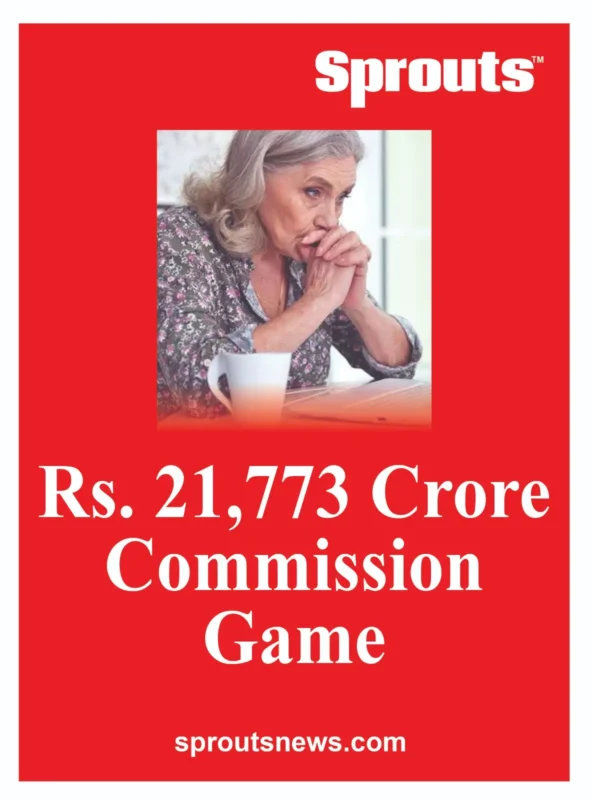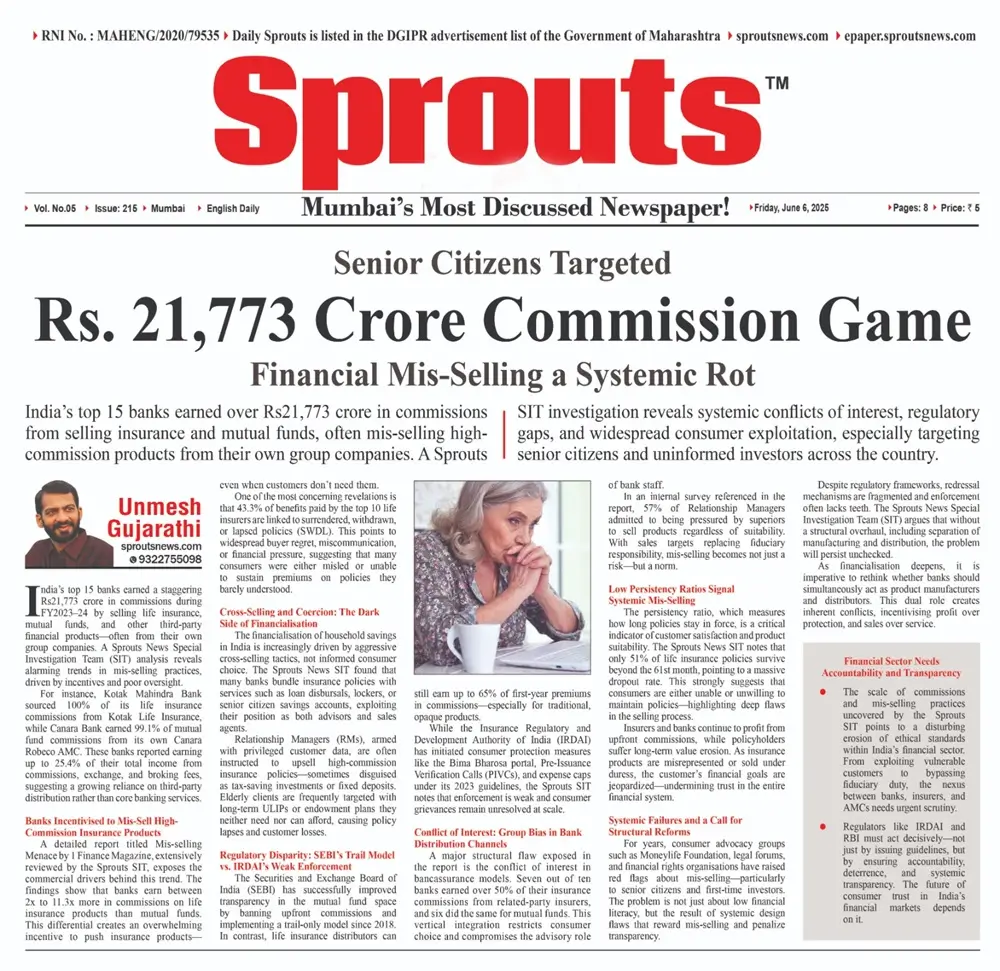Rs. 21,773 Crore Commission Game
• Senior Citizens Targeted
• Financial Mis-Selling a Systemic Rot
Unmesh Gujarathi
Sprouts News Exclusive
Contact: +91 9322755098
- Rs. 21,773 Crore Commission Game
- • Senior Citizens Targeted
- • Financial Mis-Selling a Systemic Rot
- Banks Incentivised to Mis-Sell High-Commission Insurance Products
- Cross-Selling and Coercion: The Dark Side of Financialisation
- Regulatory Disparity: SEBI’s Trail Model vs. IRDAI’s Weak Enforcement
- Conflict of Interest: Group Bias in Bank Distribution Channels
- Low Persistency Ratios Signal Systemic Mis-Selling
- Also Read: Is Dr. Shailendra Deolankar Serving Education—or a Private Agenda?
- Systemic Failures and a Call for Structural Reforms
- Financial Sector Needs Accountability and Transparency
India’s top 15 banks earned over Rs21,773 crore in commissions from selling insurance and mutual funds, often mis-selling high-commission products from their own group companies. A Sprouts SIT investigation reveals systemic conflicts of interest, regulatory gaps, and widespread consumer exploitation, especially targeting senior citizens and uninformed investors across the country.
India’s top 15 banks earned a staggering Rs21,773 crore in commissions during FY2023–24 by selling life insurance, mutual funds, and other third-party financial products—often from their own group companies. A Sprouts News Special Investigation Team (SIT) analysis reveals alarming trends in mis-selling practices, driven by incentives and poor oversight.
For instance, Kotak Mahindra Bank sourced 100% of its life insurance commissions from Kotak Life Insurance, while Canara Bank earned 99.1% of mutual fund commissions from its own Canara Robeco AMC. These banks reported earning up to 25.4% of their total income from commissions, exchange, and broking fees, suggesting a growing reliance on third-party distribution rather than core banking services.
Banks Incentivised to Mis-Sell High-Commission Insurance Products
A detailed report titled Mis-selling Menace by 1 Finance Magazine, extensively reviewed by the Sprouts SIT, exposes the commercial drivers behind this trend. The findings show that banks earn between 2x to 11.3x more in commissions on life insurance products than mutual funds. This differential creates an overwhelming incentive to push insurance products—even when customers don’t need them.
One of the most concerning revelations is that 43.3% of benefits paid by the top 10 life insurers are linked to surrendered, withdrawn, or lapsed policies (SWDL). This points to widespread buyer regret, miscommunication, or financial pressure, suggesting that many consumers were either misled or unable to sustain premiums on policies they barely understood.

Cross-Selling and Coercion: The Dark Side of Financialisation
The financialisation of household savings in India is increasingly driven by aggressive cross-selling tactics, not informed consumer choice. The Sprouts News SIT found that many banks bundle insurance policies with services such as loan disbursals, lockers, or senior citizen savings accounts, exploiting their position as both advisors and sales agents.
Relationship Managers (RMs), armed with privileged customer data, are often instructed to upsell high-commission insurance policies—sometimes disguised as tax-saving investments or fixed deposits. Elderly clients are frequently targeted with long-term ULIPs or endowment plans they neither need nor can afford, causing policy lapses and customer losses.
Regulatory Disparity: SEBI’s Trail Model vs. IRDAI’s Weak Enforcement
The Securities and Exchange Board of India (SEBI) has successfully improved transparency in the mutual fund space by banning upfront commissions and implementing a trail-only model since 2018. In contrast, life insurance distributors can still earn up to 65% of first-year premiums in commissions—especially for traditional, opaque products.
While the Insurance Regulatory and Development Authority of India (IRDAI) has initiated consumer protection measures like the Bima Bharosa portal, Pre-Issuance Verification Calls (PIVCs), and expense caps under its 2023 guidelines, the Sprouts SIT notes that enforcement is weak and consumer grievances remain unresolved at scale.
Conflict of Interest: Group Bias in Bank Distribution Channels
A major structural flaw exposed in the report is the conflict of interest in bancassurance models. Seven out of ten banks earned over 50% of their insurance commissions from related-party insurers, and six did the same for mutual funds. This vertical integration restricts consumer choice and compromises the advisory role of bank staff.
In an internal survey referenced in the report, 57% of Relationship Managers admitted to being pressured by superiors to sell products regardless of suitability. With sales targets replacing fiduciary responsibility, mis-selling becomes not just a risk—but a norm.
Low Persistency Ratios Signal Systemic Mis-Selling
The persistency ratio, which measures how long policies stay in force, is a critical indicator of customer satisfaction and product suitability. The Sprouts News SIT notes that only 51% of life insurance policies survive beyond the 61st month, pointing to a massive dropout rate. This strongly suggests that consumers are either unable or unwilling to maintain policies—highlighting deep flaws in the selling process.
Insurers and banks continue to profit from upfront commissions, while policyholders suffer long-term value erosion. As insurance products are misrepresented or sold under duress, the customer’s financial goals are jeopardized—undermining trust in the entire financial system.

Also Read: Is Dr. Shailendra Deolankar Serving Education—or a Private Agenda?
Systemic Failures and a Call for Structural Reforms
For years, consumer advocacy groups such as Moneylife Foundation, legal forums, and financial rights organisations have raised red flags about mis-selling—particularly to senior citizens and first-time investors. The problem is not just about low financial literacy, but the result of systemic design flaws that reward mis-selling and penalize transparency.
Despite regulatory frameworks, redressal mechanisms are fragmented and enforcement often lacks teeth. The Sprouts News Special Investigation Team (SIT) argues that without a structural overhaul, including separation of manufacturing and distribution, the problem will persist unchecked.
As financialisation deepens, it is imperative to rethink whether banks should simultaneously act as product manufacturers and distributors. This dual role creates inherent conflicts, incentivising profit over protection, and sales over service.
Financial Sector Needs Accountability and Transparency
The scale of commissions and mis-selling practices uncovered by the Sprouts SIT points to a disturbing erosion of ethical standards within India’s financial sector. From exploiting vulnerable customers to bypassing fiduciary duty, the nexus between banks, insurers, and AMCs needs urgent scrutiny.
Regulators like IRDAI and RBI must act decisively—not just by issuing guidelines, but by ensuring accountability, deterrence, and systemic transparency. The future of consumer trust in India’s financial markets depends on it.


















